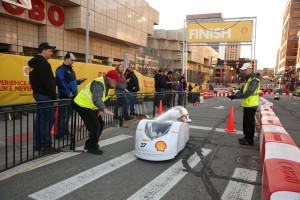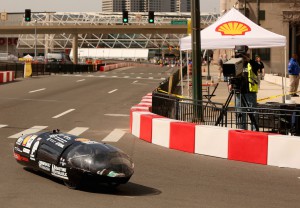
The Chloe Gasoline Prototype, competing for team Northridge High School from Northridge High School, Middlebury, Indiana, hits the finish line in Detroit.
The future became the present in Detroit last weekend when more than 100 futuristic looking cars from took to the city streets trying to thousands of miles on just one gallon of gasoline in the annual Shell Eco-Marathon Americas 2015.
The event attracts entrants from high schools and colleges in five countries who traverse a nearly one-mile course trying to squeak out as much mileage as possible from their experimental vehicles. The winning team in Detroit was the University of Toronto, who edged our perennial rivals from Quebec’s Université Laval, with a rating of 3,421 miles per gallon. It was 2% better than Laval’s entry that set the bar at 3,365 miles per gallon.
Laval is almost finishes at the top of these types of events, and bested Toronto at last year’s Eco-Marathon in Houston. Toronto had to overcome a slew of technical problems during the competition, which came down to the wire.
“We had problems with our battery, and our steering actually broke,” said driver Kristine Confalone. Then, on their seventh and final outing, it all came together: “We were one of the last cars on the track,” Confalone said. ““We were really lucky to be able to go again right after and get that last one in.”

The Moncton Mobile Gasoline Prototype, competing for team Umoncton Supermileage from Universite de Moncton, Moncton, NB, Canada.
The competition gives the teams a chance to not only demonstrate their skills technically, but also behind the wheel as piloting the cars correctly is just as important as having the technology set up correctly when it comes to squeezing out every last drop.
The student teams compete in several categories, including gasoline, battery-electric, diesel and others. The vehicles also must pass a detailed technical inspection to ensure a level playing field as well as the safety of the competitors.
A team of professional technical experts scrutinizes each car, measuring and testing for height, width, track, tire size, vehicle and driver weight and much more. A car must be certified meeting all official rules and specifications. It usually takes several tries for most teams to pass.
(Automakers put their cars on a diet. For more, Click Here.)
“Usually seat belts and brakes are the recurring issues,” says Shell Eco-marathon Americas Test Director Adrian Juergens. “Those brakes can have a hard time holding the vehicles on our test ramp,” he says. The brakes must hold the car with driver steady on a inclined ramp to be certified track ready.
In addition to the aforementioned first- and second-place finishers in the gasoline category for college teams, Mater Dei high school won the UrbanConcept category, for a second year in a row with its purple petrol car, last year’s winner “Elroy,” at 485 mile per gallon.
(Click Here for details how more than half of cars will have stop-start by 2024.)
The Evansville, Indiana, team also won the battery-electric Prototype category in its Supermileage-3 car with an efficiency rating of 450 miles per kilowatt hour. They also took third place in the petrol Prototype category.
Colorado’s Wheat Ridge High School takes the Prototype hydrogen fuel cell crown back to the Rockies, with a 151 miles per kilowatt-hour efficiency rate. The University of Colorado Boulder captured the Prototype alternative fuels award for the second straight year with its car, “Tatonkatoo,” posting 842 miles per gallon burning ethanol.
(To see about the pending turmoil at Volkswagen, Click Here.)
Sullivan High School had clutch problems and even threw the drive chain, but still won the diesel Prototype category for a third straight year with a mark of 1,436 miles per gallon.
